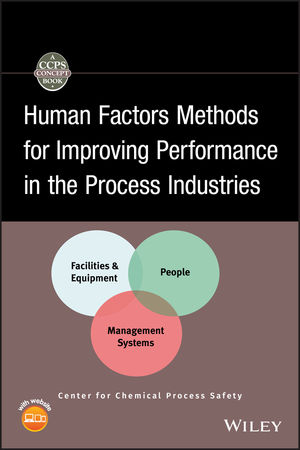Human Factors Methods for Improving Performance in the Process IndustriesISBN: 978-0-470-11754-5
Hardcover
256 pages
January 2007
 This is a Print-on-Demand title. It will be printed specifically to fill your order. Please allow an additional 10-15 days delivery time. The book is not returnable.
|
||||||
Preface xi
Acknowledgments xiii
Abbreviations and Acronyms xv
1 Introduction 1
1.1 Purpose of This Book 1
1.2 Human Factors 1
1.3 Human Error 3
1.4 Structure of This Book 5
1.5 Linkage to Other CCPS Publications 6
1.6 References 7
2 The Case for Human Factors 9
2.1 Why is Human Factors Needed? 9
2.2 Past Incidents 11
2.3 Business Value/Justification 11
2.4 Human Factors in the Life Cycle of a Chemical Plant 16
2.5 Needs Driven Program 17
2.6 References 19
3 Performance Measurement and Improvements 21
3.1 Building Improvements into Existing Systems 21
3.2 Measures of Performance 22
3.3 Roles and Responsibilities 24
3.4 Continuous Improvement 25
3.5 References 28
HUMAN FACTORS TOOL KIT
Facilities and Equipment
4 Process Equipment Design 31
4.1 Introduction 31
4.2 Tools 33
4.3 References 33
4.4 Additional References 34
5 Process Control Systems 37
5.1 Introduction 37
5.2 Issues/Example 37
5.3 Tools 39
5.4 Additional References 39
6 Control Center Design 41
6.1 Introduction 41
6.2 Tools 42
6.3 References 43
6.4 Additional References 43
7 Remote Operations 45
7.1 Introduction 45
7.2 Tools 47
7.3 Reference 48
8 Facilities and Workstation Design 49
8.1 Introduction 49
8.2 Tools 53
8.3 References 55
8.4 Additional References 55
9 Human/Computer Interface 57
9.1 Introduction 57
9.2 Human Interactions with Control System Software 58
9.3 Tools 59
9.4 References 63
9.5 Additional References 64
10 Safe Havens 67
10.1 Introduction 67
10.2 Human Factors Issues 68
10.3 Tools 70
10.4 References 70
11 Labeling 71
11.1 Introduction 71
11.2 Tools 72
11.3 References 74
People
12 Training 77
12.1 Introduction 77
12.2 Guidelines for Training Programs 77
12.3 Guidelines for Designing and Delivering Training 78
12 4 Tools 81
12.5 References 81
13 Communications 83
13.1 Introduction 83
13.2 Issues/Examples 83
13.3 Tools 85
13.4 References 85
14 Documentation Design and Use 87
14.1 Introduction 87
14.2 Converting to Electronic Documentation 88
14.3 Use of Documents 90
14.4 Tools 92
14.5 References 93
14.6 Additional References 94
15 Environmental Factors 95
15.1 Introduction 95
15.2 Noise 95
15.3 Vibration 96
15.4 Temperature and Relative Humidity 99
15.5 Air Quality 101
15.6 Lighting 102
15.7 References 105
16 Workloads and Staffing Levels 107
16.1 Introduction 107
16.2 Issues/Examples 107
16.3 Tools 108
16.4 References 109
17 Shiftwork Issues 111
17.1 Introduction 111
17.2 Tools 112
17.3 References 114
17.4 Additional References 114
18 Manual Materials Handling 117
18.1 Introduction 117
18.2 Manual Materials Handling Guidelines 118
18.3 References 121
18.3 Additional References 122
Management Systems
19 Safety Culture 125
19.1 Introduction 125
19.2 What is Safety Culture? 125
19.3 Tools 127
19.4 Safety Culture: A Process Industry Case Study 130
19.5 Benefits 131
19.6 References 131
19.7 Additional References 132
20 Behavior Based Safety 133
20.1 Introduction 133
20.2 Tools 134
20.3 Expected Results 137
20.4 References 137
20.5 Additional References 138
21 Project Planning, Design, and Execution 139
21.1 Introduction 139
21.2 Human Factors Tools for Project Management 139
21.3 References 143
22 Procedures 145
22.1 Introduction 145
22.2 Tools 146
22.3 References 151
22.4 Additional References 151
23 Maintenance 153
23.1 Introduction 153
23.2 Identifying Critical Maintenance Tasks 153
23.3 Maintenance Protocol 154
23.4 Tools 155
23.5 References 156
24 Safe Work Practices and Permit-to-Work Systems 159
24.1 Introduction 159
24.2 Issues 159
24.3 Tools 163
24.4 References 164
24.5 Additional Reference 164
25 Management of Change 165
25.1 Introduction 165
25.2 Tools 167
25.3 References 172
26 Qualitative Hazard Analysis 175
26.1 Introduction 175
26.2 Tools—Human Failures 176
26.3 Tools—Human Factors 177
26.4 References 179
26.5 Additional References 180
27 Quantitative Risk Assessment 181
27.1 Introduction 181
27.2 Tools 183
27.3 References 184
27.4 Additional References 184
28 Safety Systems 185
28.1 Introduction 185
28.2 People and Safety Systems 185
28.3 Bypassing and Disabling Safety Systems 185
28.4 Shutdown Systems 188
28.5 Selection of Safety Systems 189
28.6 Common Cause Failures in Safety Systems 189
28.7 Tools 190
28.8 References 190
29 Competence Management 191
29.1 Introduction 191
29.2 Elements of Competence Management 193
29.3 Tools 196
29.4 References 197
29.5 Additional References 197
30 Emergency Preparedness and Response 199
30.1 Introduction 199
30.2 Tools 199
30.3 Reference 202
30.4 Additional References 202
31 Incident Investigation 203
31.1 Introduction 203
31.2 Issues/Examples 203
31.3 Tools 205
31.4 References 205
Appendix. Human Factors Checklist 207
Index 225



